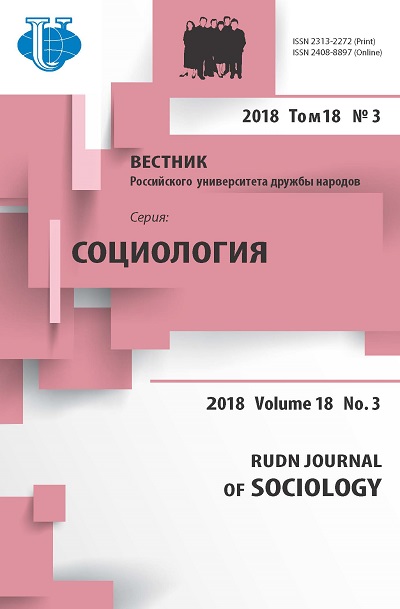SOCIAL PORTRAIT OF THE FEMALE TEACHER (on the example of the Tyumen Region)
- Authors: Efimova GZ1, Semenov MY.1
-
Affiliations:
- Tyumen State University
- Issue: Vol 18, No 3 (2018)
- Pages: 521-531
- Section: Surveys, experiments, case studies
- URL: https://journals.rudn.ru/sociology/article/view/19187
- DOI: https://doi.org/10.22363/2313-2272-2018-18-3-521-531
- ID: 19187
Cite item
Full Text
Abstract
The article presents official statistical data that indicate the prevalence of women in the teaching staff of general education in Russia and some other countries. Structural feminization of education requires a study of social-cultural and other consequences of this social-professional phenomenon. The authors combine the consequences of teachers’ feminization into two groups: assimilation of the predominantly feminist model of behavior and gender asymmetry in education. The article aims at describing social characteristics of female teachers in Russia and the impact of the teaching profession on the daily life of women based on the surveys (in 2015 and 2016) conducted by the Sociological Laboratory of the Tyumen State University on the representative quota-nesting sample. The authors focus on social rather than professional characteristics of female teachers in Russia, that is why they chose the following indicators: satisfaction with the current social status; proportion of time free from professional and household activities; state of health; look into the future. The main contradictions and peculiarities of everyday life of female teachers were outlined: there is a low level of dissatisfaction with one’s social position due to the awareness of one’s social status and specific social expectations for women due to the prevailing traditional models of female roles; female teachers assess ones’ state of health higher than an average Russian woman due to the strong social capital providing a higher level of social support, which is acquired in the course of professional activities. Perhaps, this is also the reason why the share of female teachers that perceive their future negatively starts to grow later than on average in Russia.
About the authors
G Z Efimova
Tyumen State University
Author for correspondence.
Email: g.z.efimova@utmn.ru
-
Lenina St., 16, Tyumen, 625003, RussiaM Yu Semenov
Tyumen State University
Email: m.y.semenov@utmn.ru
-
Lenina St., 16, Tyumen, 625003, RussiaReferences
- Borisov U.S. Socialny portret uchitelya Respubliki Sakha [Social portrait of the teacher in the Sakha Republic]. Sociologicheskie Issledovaniya. 1998; 8 (In Russ.).
- Voormann R., Helemae E. Otsenka zdorovya muzhchinami i zhenschinami v Rossii, Estonii, Litve i Finlyandii [Gender health self-ratings in Russia, Estonia, Lithuania and Finland]. Sociologicheskie Issledovaniya. 2016; 7 (In Russ.).
- Efimova G.Z., Semenov M.Yu. Klyuchevye bariery, prepyatstvuyuschie effektivnoj rabote uchitelya: po materialam sociologicheskogo issledovaniya [Key barriers to the effective work of teachers: The results of sociological research]. Teoriya i Praktika Obschestvennogo Razvitiya. 2015; 2 (In Russ.).
- Ilchenko V.V., Bekoeva T.A. Socialno-psihologicheskie aspekty udovletvorennosti brakom u muzhchin i zhenschin [Social-psychological aspects of satisfaction with marriage among men and women]. Ekonomicheskie i Gumanitarnye Issledovaniya Regionov. 2016; 5 (In Russ.).
- Kotlova T.B. Uchitelnitsy v Rossijskoj provintsii sto let nazad [Female teachers in the Russian province 100 years ago]. Zhenschina v Rossijskom Obhchestve. 2001; 1—2 (In Russ.).
- Makhiyanova A.V. Socialnyj portret naseleniya: sravnitelnyj analiz vysokodohodnyh i nizkodohodnyh grupp [Social portrait of the population: A comparative analysis of high- and low-income groups]. Diskussia. 2016; 9 (In Russ.).
- Nizhegorodova L.A. Ozdorovlenie semejnyh otnoshenij u zhenschin uchitelej kak sposob preodoleniya lichnostnyh deformatsij [Improvement of family relations among female teachers as a way to overcome personal problems]. Nauchnoe Obespechenie Sistemy Povysheniya Kvalifikatsii Kadrov. 2011; 1 (In Russ.).
- Obrazovanie v tsifrah: 2017 [Education in Figures: 2017]. Ed. by L.M. Gohberg, I.Yu. Zabaturina, G.G. Kovaleva. Moscow: NIU VShE; 2017 (In Russ.).
- Polyvyannaya M.T. K voprosu o feminizatsii uchitelstva [On the feminization of teaching]. Zhenschina v Rossijskom Obschestve. 2006; 3 (In Russ.).
- Porsh L.A. Feminizatsiya pedagogicheskoj professii v kontekste obnovleniya roli obrazovaniya v razvitii rossijskogo obschestva [Feminization of the teaching profession under the renewal of the role of education in the development of the Russian society]. Vestnik ZabGU. 2013; 8 (In Russ.).
- Rossijskij statistichesky ezhegodnik [Russian Statistical Yearbook]. Moscow; Rosstat; 2017 (In Russ.).
- Rossijskie uchitelya v svete issledovatelskih dannyh [Russian Teachers in the Light of Research Data]. Ed. by I.D. Frumin, V.A. Bolotov, S.G. Kosaretsky, M. Karnoy. Moscow: NIU VShE; 2016 (In Russ.).
- Sillaste G.G. Gendernaya asimmetriya kak faktor kariernogo rosta zhenschiny [Gender asymmetry as a factor of the woman’s career]. Vysshee Obrazovanie v Rossii. 2004; 3 (In Russ.).
- Sokolova E.A. Stereotipny obraz uchitelya v presse provintsialnogo goroda: genderny aspekt [Stereotypical image of the teacher in the press of a provincial city: A gender aspect]. Pedagogicheskoe Obrazovanie v Rossii. 2014; 10 (In Russ.).
- Khasbulatova O.A. Rossijskaya gendernaya politika v XX stoletii: mify i realii [Russian Gender Policy in the 20th Century: Myths and Realities]. Ivanovo; 2005 (In Russ.).
- Sheregi F.E. Pedagogi obscheobrazovatelnyh organizatsij: trud ili povinnost? [Teachers of general education organizations: Labor or Service?]. Sociologicheskie Issledovaniya. 2016; 1 (In Russ.).
Supplementary files













